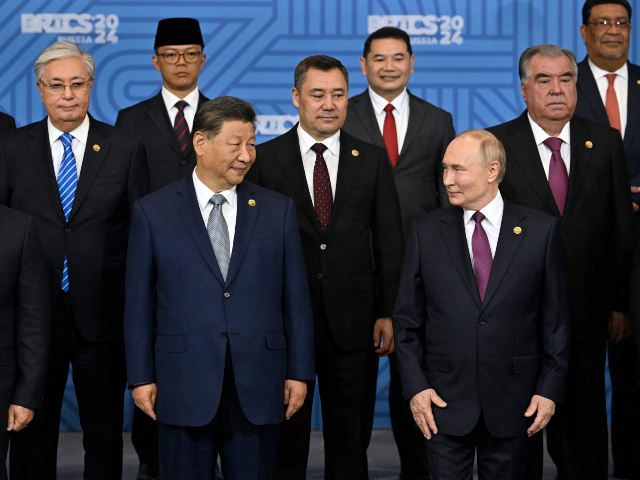Chinese Foreign Ministry spokesman Lin Jian said on Tuesday that China expects fellow members of the BRICS economic bloc to push back against President-elect Donald Trump’s tariff threats.
“As an important platform of cooperation for emerging markets and developing countries, BRICS advocates openness, inclusiveness and win-win cooperation, not bloc confrontation, and does not target any third party. The aim is to realize common development and prosperity,” Lin said at a press conference on Tuesday.
“China stands ready to continue working with BRICS partners to deepen practical cooperation in various fields and make more contributions to the sustained and steady growth of the world economy,” he said.
Russia, the “R” in BRICS, likewise rejected Trump’s statements on Monday.
“More and more countries are switching to the use of national currencies in their trade and foreign economic activities,” Kremlin spokesman Dmitry Peskov said.
“If the U.S. uses force, as they say economic force, to compel countries to use the dollar it will further strengthen the trend of switching to national currencies,” Peskov predicted.
“The dollar is beginning to lose its appeal as a reserve currency for a number of countries,” he argued.
Lin and Peskov were responding to Trump’s warning on Saturday that BRICS member nations should abandon any plans to create a new currency to replace the U.S. dollar as a medium for international trade.
“The idea that the BRICS Countries are trying to move away from the Dollar while we stand by and watch is OVER,” Trump said, writing originally on his preferred social media platform, Truth Social.
“We require a commitment from these Countries that they will neither create a new BRICS Currency, nor back any other Currency to replace the mighty U.S. Dollar or, they will face 100% Tariffs, and should expect to say goodbye to selling into the wonderful U.S. Economy,” Trump wrote, clearly planning no tariff hikes or trade restrictions on capital letters.
“They can go find another ‘sucker!’ There is no chance that the BRICS will replace the U.S. Dollar in International Trade, and any Country that tries should wave goodbye to America,” Trump declared.
BRICS has indeed been talking about developing its own currency, egged on by China and Russia, which have long plotted to dethrone the dollar. China and Russia are particularly insistent on replacing the dollar because they think it gives the U.S. too much power to impose financial sanctions.
Russia was banned from the Belgium-based SWIFT transaction system soon after invading Ukraine in February 2022, and has been loudly demanding an alternative network for international finance ever since – although Moscow has also claimed the West did it a favor by locking it out of SWIFT, because Russia’s currency was insulated from international currency market fluctuations.
BRICS has expanded greatly from the original group of Brazil, Russia, India, China, and South Africa (which was added a few years after BRIC formed in 2009). Five new full members joined in 2023, including Egypt, Iran, Saudi Arabia, the United Arab Emirates, and Ethiopia. Thirteen more “partner countries” with no voting rights were announced in October 2024, and some of those might go on to become full members.
The larger BRICS membership makes it more difficult for the group to launch a project such as an international currency, as there is little agreement among the expanded membership of how such a currency would function. Members with high growth rates would have very different expectations than those with less dynamic economies, for example. India would be very reluctant to give its rival China, the dominant power in BRICS, more influence over international financial transactions.
Additionally, some of the expanded BRICS members are not eager to alienate the Western world or divorce from the American dollar, especially when Donald Trump is throwing capital letters at them to get their attention.
Deutsche Welle (DW) noted on Tuesday that BRICS has been talking about developing its own currency since its inception over 25 years ago, and even when the BRICS currency once again became a hot topic at last year’s summit in South Africa, BRICS leaders said it would “likely take many years” before such a project could be launched. As DW pointed out, it took over 40 years for the euro to go from the drawing board to legal tender.
No one else in the bloc showed much interest in Russian President Vladimir Putin’s proposal for a blockchain-based alternative to SWIFT at the most recent BRICS summit in October. Most of the members would rather strengthen their own currencies than commit massive resources to creating a replacement for the U.S. dollar.
Two days after Trump made his tariff threat, South Africa insisted BRICS has no active plans to create its own currency.
“Recent misreporting has led to the incorrect narrative that BRICS is planning to create a new currency. This is not the case. The discussions within BRICS focus on trading among member countries using their own national currencies,” South Africa’s Department of International Relations and Cooperation (DIRCO) said.
“South Africa supports the increased use of national currencies in international trade and financial transactions to mitigate the impact of foreign exchange fluctuations, rather than focusing on de-dollarisation,” DIRCO added.
